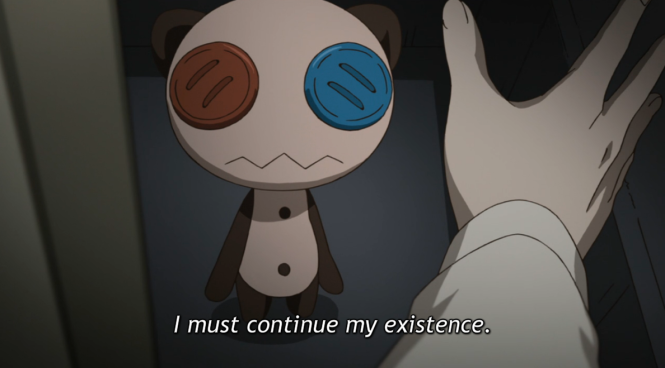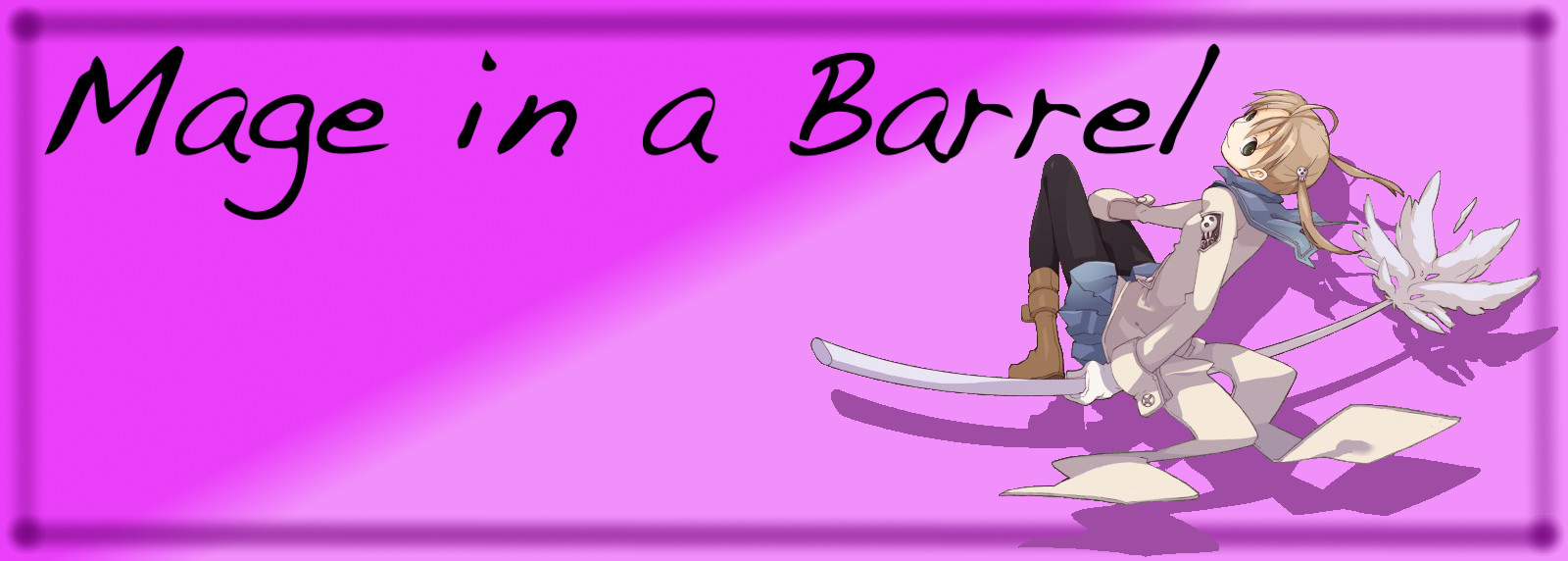Un-Go purports to be a show about truth—about finding, unveiling, and understanding truth in a world where truth is distorted, manipulated, created, and abused. The main character, Shinjurou Yuuki, is accompanied by a spirit with the power to demand a single truth from any human being.
Yet, it is perhaps the artificial intelligence, Kazamori, who becomes the most elegant image of truth in the world of Un-Go.
As a character, Kazamori is the best thing about Un-Go. A Real Artificial Intelligence (RAI)—that is, a non-human conciousness—Kazamori is spirited, snarky, perceptive, and flexible. Kazamori also inhabits a loli robot body and the body of a stuffed panda. Kazamori is funny. Kazamori does cool things. Kazamori made the more insufferable episodes of Un-Go and it’s kind of lame mysteries and thematic gyrations digestible. Kazamori also does a better job of interacting with Un-Go‘s ideas about truth and deception—simply by existing!—than the rest of the show.
Aside from all the presentation issues that Un-Go has—uninspired, inconsistent storyboarding and clunky, formulaic writing—it also generally fails to interact with the idea of “truth” in any meaningful way within the context of its mysteries. Shinjurou can forcibly drag one truth out of people with his magic sidekick, but ultimately he’s done nothing more than solve the mystery—he never actually contacts the root of the problem: people need lies to live. Or, at least, some think they do. And not all truths and lies are created equal.
Bu by drawing a false binary between the two, Shinjurou actually invalidates the very idea of Kazamori: and that’s not okay by me.
You see, Kazamori is something of a truth-lie herself. She’s not a real human, but to simply call her a robot seems to fall far short of the truth considering her sentience and intelligence. By law, she’s banned from existing because of the threat her kind posed to general human decency. And she operates outside of this law with Shinjurou, because his own issues with the establishment provide her with a safe haven. So Kazamori can help Shinjuurou, pull him out of magically induced delusions, and support his deductive efforts.
In other words, Kazamori occupies something of a liminal state between the real (what Shinjurou might call real) and the fake (what Shinjurou) might call a lie. Human-like and inhuman. A machine, yet not. You might even call her a…created truth.
Which, of course, is the very sort of thing Shinjurou seeks to tear down at all costs, disregarding the context and situation in a wanton pursuit of his own purified ideal of truth. It’s appropriate, then, that Kazamori would be the one to interrogate Shinjurou’s motives, gyrating in vaguely unnatrual stretches all the while.
But I said before that Kazamori an image of truth in this world of lies—and I meant it. Kazamori is the realest darned thing in Un-Go, a fact underscored by the irony of her weird half-truth existence. Quirkiness on its own isn’t enough to make a character feel fully alive and themselves, but Kazamori’s offbeat personality, when combined with her existential complexity, snarky attitude, and body switching antics, ground her as a self-contained being in a show filled with characters who blur into concepts and back.
You seek for the truth, Shinjurou Yuuki? Look no further than the panda on your shoulder.
Now, while it may seem that I’m playing unfairly here by talking about Kazamori in terms of her metatextual presentation (versus as a manifestation of a conflicting idea in the world of Un-Go where Shinjurou seeks to purify lies without distinction), it’s actually an important point that Kazamori feels “real.” After all, with Shinjurou’s motivations being nothing more than blurred and unclear ideals, and Inga’s inhuman hunger obfuscating any sort of complete grasp on his nature as a real player, the Kazamori who kind of just floats along with the story as she does suddenly becomes a beacon of something firm, something truthful.

I do fear that, by setting up Kazamori as the redeeming feature of Un-Go amidst the show’s failings as an effective contemplation of truth, lies, fiction, and reality, it may seem that this ode to Kazamori is merely an ode to a character who only stands out due to the contrast with the rest of her lacking show.
This is untrue.
The truth is that Kazamori is a robot who is more real a character, from both a craft and narrative standpoint, than any of the humans or spirits that accompany her in Un-Go. Kazamori survives, the last of her kind. And proof that, sometimes, a fiction can become a reality. And that’s okay.

This post is part of the aniblogger Secret Santa project.




[…] Un-Go as recommended […]
LikeLike
You’re absolutely right that Un-Go is a show about the truth, but I think it’s trying to get at the idea that we sometimes prefer “beautiful lies” to the “ugly truth,” and why that might be so. As such, Shinjurou is the character my own attitudes pivoted around – is his ceaseless quest to expose ugly truths the work of an asshole, or that of someone doing important, if dirty work?
I agree that Un-Go’s story-telling is pretty messy sometimes, but I think it ultimately makes its point really well. That is, we’re much better off knowing the ugly truth than being lied to for “our own good.”
Did you watch Episode 0? Although I doubt it will change your opinion, I think it does a great job of showing how Shinjurou’s rather bleak and uncompromising worldview developed, especially when viewed after the series.
LikeLike
I did not watch episode 0, although that might have been a good thing to help me get a better grasp on Shinjurou’s character. He feels like he works in a vacuum sometimes to me.
And I do think I agree with what you’re saying about the show making it’s point well! I just didn’t particularly care for the way it went about doing so—besides Inga being an overly convenient way of doing things, I think it did a poor job of showing why the ugly truth might be better (a few occasions aside). All the stuff with Bettenou and Inga could have really helped solidify the thematic duality of illusion:reality, but I don’t think it came together in any meaningful way, sadly.
Thus, Kazamori. 🙂
LikeLike
Definitely watch episode 0. I found the movie much better than the series, though it’s not independent.
I also never saw Inga as a tool to achieve something (“an overly convenient way of doing things”), but rather as the starting point of a thought experiment. What if you could extract exactly one secret (the show associates the stealing of secret with stealing a part of your soul: it’s something a “demon” “eats”).
I don’t remember Un-Go well enough to comment beyond that.
LikeLike